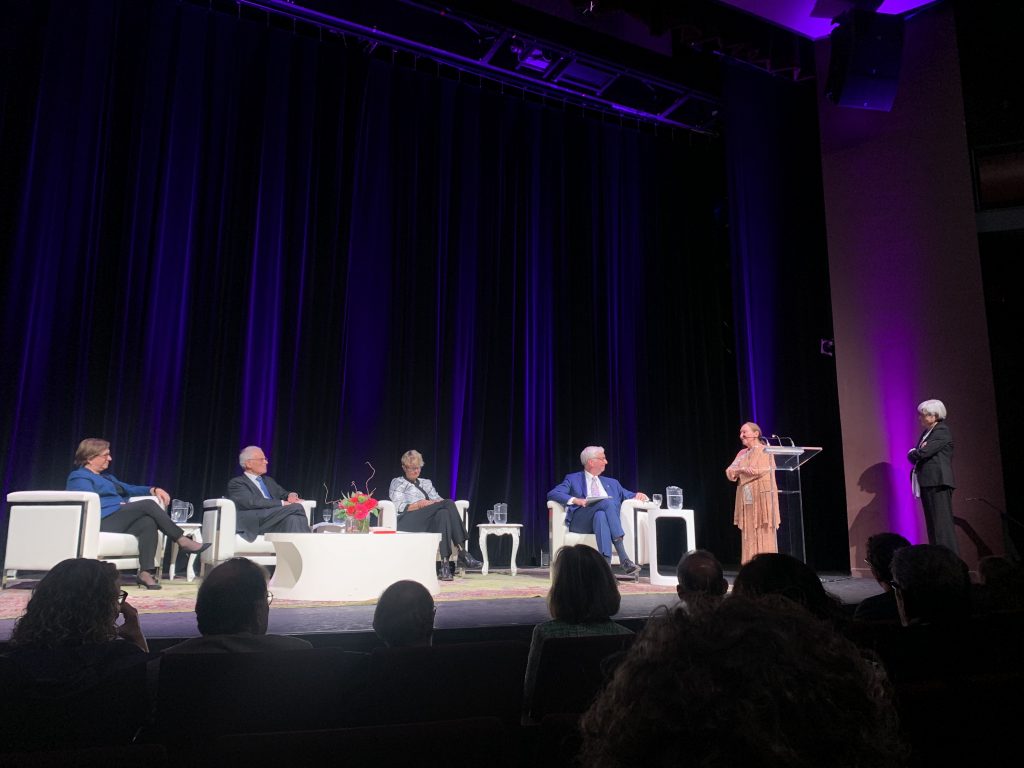Justices from around the world celebrate Justice Abella’s life and legacy after retirement from the SCC

On September 22, 2022, scholars and students from across the globe gathered to celebrate Justice Rosalie Silberman Abella at the Faculty of Law’s Justice Beyond Borders event. Justice Abella served on the Supreme Court of Canada (SCC) for 17 years until her retirement last July. The roundtable discussion and dinner provided an opportunity to honour and reflect on Justice Abella’s many achievements and worldwide influence.
The roundtable featured three of Justice Abella’s friends: Justice Susanne Baer of the Federal Constitutional Court of Germany, Lord John Anthony Dyson of the Supreme Court of the United Kingdom, and Associate Justice Elena Kagan of the Supreme Court of the United States. The discussion was moderated by Professor Stephen Toope, Vice-Chancellor of the University of Cambridge.
Each panellist shared stories on how Justice Abella influenced their life and legal careers. Lord Dyson spoke of his friendship with Justice Abella and her “warmth, informality, and kindness.” He remarked how Justice Abella’s judgments transcend the Canadian borders, in particular, her “powerful and principled” decision in Nevsun Resources Ltd. v Araya. Justice Baer gave a passionate speech on how Justice Abella’s reasonings are largely rooted in what she calls “post-World War II constitutionalism.” That is, a commitment to a substantive rule of law (as opposed to a formal, often empty notion), embracing judicial review of legislation, and a holistic understanding of fundamental rights. Continuing the discussion on Justice Abella’s influence, Justice Kagan celebrated her renowned global reputation for being a changemaker, in contrast to her own characterization as an incrementalist judge. From coining the term “employment equity” in Canada to being the first refugee on the SCC, Justice Abella’s many accomplishments make her one of the world’s most famous Supreme Court justices—one that everybody aspires to be.
The conversation shifted into a discussion on the applicability and relevance of international law. The panellists had diverging views on when, how, and if judgments from foreign jurisdictions can play a role in deciding domestic cases. While Justice Baer and Lord Dyson were more open to incorporating foreign judgments in their decision making process, with Justice Baer emphasising the importance of approaching “problems that know no borders” in a consistent and coherent manner, Justice Kagan noted that it would be extremely rare for an American justice to consider non-American case law. She explained that each jurisdiction has their own traditions and histories that generally take precedence over any foreign considerations.
Finally, Justice Abella took the stage to roaring applause. On the debate, she noted that there was not a single case at the SCC where she didn’t ask her law clerks to find relevant foreign jurisprudence. Even if she did not apply the foreign reasoning, she noted that, “it stretches the mind to think about law differently, knowing where it comes from, to think about life differently, politics differently… It makes you humble to know it is not just about you or your country. It is about being part of a global enterprise of judicial thinking.”
Although the justices at times had differing views, Justice Abella expressed how lucky she is to learn from them. “Something the public never really gets to see is the obvious: judges are people. My friends happen to be judges who are wonderful people.”
The hugging, tears, and stories continued into dinner, where Dean Emeritus Ronald Daniels gave a heartwarming speech on the 2002 Reverse Moot followed by Justice Abella’s reflections on the important people in her life.
During the dinner, Dean Jutta Brunnée also announced the creation of the new Rosalie and Irving Abella Chair for Justice and Equality. The chair is in honour of Justice Abella and her late husband, who spent a large majority of their lives working to advance equality rights. The Dean shared that the Faculty secured over two million dollars in donations for the chair.
Attendees left the evening’s festivities inspired. Many noted that Justice Abella was their “legal role model” and that her contributions to not only the Canadian judiciary but the global justice system will last for many years to come.
Reflecting on the event, Hussein Fawzy (3L) commented, “Justice Abella brought us back to the basics. She reminded us that the law is ultimately about the people and that we owe them a duty to listen to their needs. It was also a call to action as we navigate a period marked with a rise in hate, discrimination, and intolerance. As she took us through her incredible life journey and the trauma that she and her family had to endure, it was a serious reminder that we shouldn’t take justice for granted, and that we should strive to do our best to attain and preserve it.”





